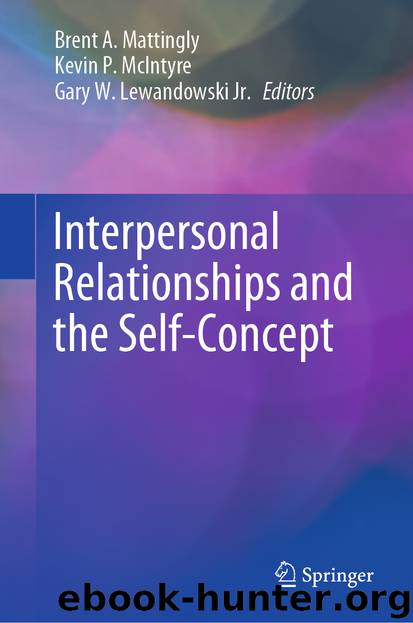Interpersonal Relationships and the Self-Concept by Brent A. Mattingly & Kevin P. McIntyre & Gary W. Lewandowski

Author:Brent A. Mattingly & Kevin P. McIntyre & Gary W. Lewandowski
Language: eng
Format: epub
ISBN: 9783030437473
Publisher: Springer International Publishing
7.2 The Michelangelo Phenomenon
Romantic relationships may provide a fertile context for encouraging self-authenticity. This hypothesis builds on theoretical and empirical work suggesting that social relationships facilitate personal growth (Lee, Ybara, Gonzalez, & Ellsworth, 2018) and that individuals experience considerable self-concept change when they enter romantic relationships and as they become increasingly committed to their partners (Agnew, Van Lange, Rusbult, & Langston, 1998; Aron, Aron, & Smollan, 1992; Mattingly et al., 2014). According to interdependence theory, behaviors, dispositions, or motivations that begin as interaction-specific adaptations may become habitual ways of being over time (Kelley & Thibaut, 1978; Rusbult & Van Lange, 2003). In other words, individuals make accommodations and modifications to their own self-concepts as they regularly interact with another person who, be it intentionally or unintentionally, encourages certain aspects of self and discourages others. The cognitive interdependence that individuals experience with their romantic partners (Agnew & Etcheverry, 2006) and the integration of self and other that occurs in close relationships (Aron, Aron, Tudor, & Nelson, 1991) highlight the unique potential of romantic partners to facilitate self-concept change.
The possibility that romantic partners can promote self-concept change is captured in the Michelangelo phenomenon. The Michelangelo phenomenon describes a loving dynamic in which romantic partners enable self-concept change by helping each other move toward their ideal selves (Drigotas et al., 1999; Rusbult et al., 2005). The talents of its namesake, the Renaissance painter and sculptor Michelangelo Buonarroti, are called upon in the original introduction of this interpersonal model (Drigotas et al., 1999) and in subsequent descriptions (e.g., Rusbult, Finkel, & Kumashiro, 2009) in order to illustrate the focal interpersonal dynamic. The metaphor rests on the idea that as a sculptor, Michelangelo chipped and chiseled at marble not in order to create, but rather in order to “reveal the ideal form slumbering within” (Rusbult et al., 2009: p. 305). Importantly, it is not Michelangelo’s vision that is imposed upon the marble, rather he simply enacts behaviors that allow the “ideal form” to be released. This metaphor provides the basis for the idea that romantic partners might serve as sculptors, helping each other move toward an “ideal form” (i.e., his or her ideal self).
Key to the Michelangelo phenomenon is evidence suggesting that individuals do possess multiple selves (Higgins, 1987; Markus & Nurius, 1986). A person’s present self (i.e., the actual self; Higgins, 1987) is a self-representation centered on current attributes, such as existing skills, traits, roles, and behavioral tendencies. In addition to the actual self, people also maintain guiding, future-oriented selves, such as the ought self (i.e., what a person believes she should be; Higgins, 1987) and the ideal self. The ideal self encompasses the type of person an individual aspires to become: the constellation of behaviors, traits, and skills she wishes to acquire (Higgins, 1987; Markus & Nurius, 1986). People are fundamentally oriented toward self-growth (Deci & Ryan, 2000), and this ideal self can serve as a compass that directs individuals’ self-growth. Because people experience distress to the extent that their actual self is
Download
This site does not store any files on its server. We only index and link to content provided by other sites. Please contact the content providers to delete copyright contents if any and email us, we'll remove relevant links or contents immediately.
The Hacking of the American Mind by Robert H. Lustig(4356)
Right Here, Right Now by Georgia Beers(4191)
Fingerprints of the Gods by Graham Hancock(3980)
Goodbye Paradise(3791)
Bad Pharma by Ben Goldacre(3414)
Happiness by Matthieu Ricard(3031)
More Language of Letting Go: 366 New Daily Meditations by Melody Beattie(3015)
The Social Psychology of Inequality by Unknown(3011)
The Plant Paradox by Dr. Steven R. Gundry M.D(2597)
Drugs Unlimited by Mike Power(2582)
Confessions of a Shopaholic by Sophie Kinsella(2337)
Borders by unknow(2299)
Make Love Not Porn by Cindy Gallop(2092)
Dry by Augusten Burroughs(2089)
Stop Being Mean to Yourself: A Story About Finding the True Meaning of Self-Love by Melody Beattie(1978)
Getting Off by Erica Garza(1926)
Belonging by Unknown(1845)
Yoga and the Twelve-Step Path by Kyczy Hawk(1828)
Unmasking Male Depression by Archibald D. Hart(1796)
